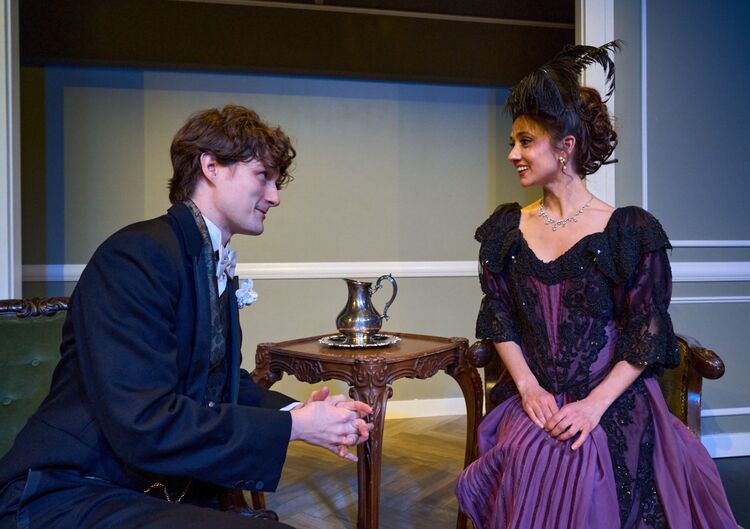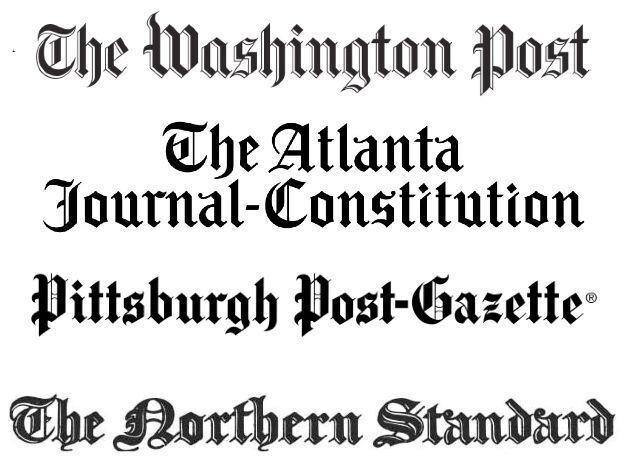[caption id="attachment_70853" align="aligncenter" width="600" caption="The Titanic visitor center in Belfast."]
As they sat down to dinner on the evening of April 14, 1912, the passengers on the Titanic, all three classes of them, were likely ready for a hearty meal. After all, there's nothing like bracing sea air to sharpen the appetite, and the sea being flat calm that night there was a low risk of suffering sea sickness.
And so the first class crowd sat down to its repast and here's what was on the table: Hors D'oeuvre Varies Oysters, Consomme Olga, Cream of Barley. Salmon, Mousseline Sauce, Cucumber. Filet Mignons, Lili Saute of Chicken, Lyonnaise Vegetable Marrow Farcie. Lamb, Mint Sauce, Roast Duckling, Apple Sauce, Sirloin of Beef, Chateau Potatoes. Green Peas Creamed Carrots, Boiled Rice Parmentier & Boiled New Potatoes.
Punch Romaine, Roast Squab & Cress, Cold Asparagus Vinaigrette, Pate De Foie Gras, Celery.
Waldorf Pudding, Peaches in Chartreube Jelly, Chocolate & Vanilla Eclairs, French Ice Cream.
Over in second class the fare wasn't half bad either. Here's the menu: Consomme Tapioca, Baked Haddock, Sharp Sauce Curried Chicken & Rice, Spring Lamb, Mint Sauce, Roast Turkey, Cranberry Sauce. Green Peas, Puree Turnips, Boiled Rice, Boiled & Roast Potatoes, Plum Pudding, Wine Jelly
Cocoanut Sandwich, American Ice Cream, Nuts, Assorted Fresh Fruit, Cheese, Biscuits, Coffee.
Down in third class, nobody was going to go hungry even if there was rather less variety in the menu. The precise dinner menu hasn't survived but it went something along these lines according to historical accounts and, by the by, it was designated as high tea and not dinner: On offer was Ragout of beef, potatoes and pickles, which can be interpreted as a form of Irish stew, apricots, fresh bread and butter and currant buns as well as tea.
There is actually a book entitled "Last Dinner on the Titanic" and it is worth checking out though with regard to the first class menu the old adage may well apply: "don't try this at home."
NOT IMPRESSED
Belfast is proceeding at full steam ahead with its commemoration of the Titanic and the ship's broader story but not everybody is impressed. The city where the great ship and its two sisters were launched has "coarsened itself" by exploiting the sinking of the Titanic to draw in tourists, an academic has claimed.
According to reports, William Neill, a professor of urban planning at Aberdeen University claims that "Belfast is unique in terms of the significance of the Titanic but the question must be raised as to whether that memory has been treated with enough respect.
"The city has lived with the shame of the sinking for many years. That has turned a corner and it is important that the role Belfast's great shipyard played in our maritime history is acknowledged. Whether what is now a mythic legacy should have been tied so closely to financial gain through selling 'infotainment' is more debatable."
Neill is lined up to address a conference on the phenomenon of "disaster tourism" being held in Berlin, a city that has witnessed its own share of disasters.
Neill, who is from Belfast, noted that Belfast had failed to renovate the "magnificent" drawing offices where the ship was designed.
"I am dismayed to see how my own home city has branded a Titanic Quarter where tacky souvenirs are plentiful but where one of the most important physical legacies of the Titanic story, the womb of the ship of imagination, has been side-lined and neglected," he said.
A spokesman for Belfast City Council said: "Belfast has been totally respectful of the loss of 1,512 lives on the Titanic. Relatives of those who died have been supportive of what the city has done and we believe we have remembered the tragedy but also the achievement in building the ship in an appropriate manner."
SMALLER SCALE
On the other side of Ireland from Belfast, a smaller scale commemoration will take place this weekend in the parishes of Addergoole and Lahardane in County Mayo. Both lay claim to the largest loss of life in the Titanic disaster in proportion to place. 14 locals were on the ship that fateful night to remember and 11 of them perished.
Just as Belfast is marking Titanic with a week of events, so is this quiet corner of western Ireland. The highlight will be a bell ringing ceremony in Lahardane Church between 1 a.m. and 3.15 a.m., the time of the morning on April 15, 1912, when Titanic slipped under the waves and sank two-and-half miles to the bottom of the Atlantic.
MORE THAN ICE
There is fascinating new information on the reasons for the Titanic sinking and it extends beyond just the chance encounter with that iceberg.
Reported the Daily News: Astronomers at Texas State University-San Marcos found that in January 1912, three months before the ship sank in the Atlantic and took more than 1,500 lives down with it, a perfect storm of astronomical events may have set the stage for the disaster."
The team found that on January 4, 1912, a nearly full moon was at its closest approach to Earth in 1,400 years. And the day before, the Earth was at perihelion, or its closest approach to the sun during its yearly spin around our star.
"The combined effects wreaked astronomical havoc with the Atlantic Ocean, generating a powerful spring tide that was able to dislodge Greenland icebergs off Labrador and Newfoundland, bergs that would normally have required more melting before being able to float away."
In addition, the powerful high tides generated by the moon put the bergs "in a southbound express lane, of sorts, packing movement that would have taken years into just a few months."
This contributed to the presence of an unusually large amount of icebergs in the North Atlantic shipping lanes just as the Titanic was speeding toward North America on its maiden voyage.
Guess there's no point in blaming the sailors in the Crow's Nest that night, or indeed the speed at which the great ship was pushing through the still waters. Titanic's fate had already been written in the sun, moon and stars.
KERRY'S TAKE
Senator John Kerry wrote a letter a while back expressing his concerns over the Boston College archives case. He has since penned an op-ed for the Boston Herald and here it is.
"It's an overused and oft-quoted phrase that those who fail to study the lessons of history are doomed to repeat them. But sometimes there are exceptions even to this axiom when people have worked painstakingly to overcome the most painful of history and decided together to leave something in the past in the interests of exploring a better, more peaceful future.
"In Northern Ireland leaders have done the hard work of trying to leave some of the past buried so as not to distract or destroy an effort to build a different future for all who want peace and opportunity. History must not be a weapon against those trying to seize the opportunity of today to build a more promising tomorrow.
"In an effort to use history as a learning tool, Boston College undertook a comprehensive oral history project called the Belfast Project. Between 2000 and 2006, the college collected detailed oral histories of Irish Republican and Loyalist paramilitaries, chronicling The Troubles from different perspectives. Participants were promised their interviews would be confidential until their death or until they released BC from the confidentiality agreement.
"Last spring that confidentiality was threatened and with it the fragility of efforts by many to overcome a difficult era. Britain is now applying pressure on the U.S. to turn over certain transcripts contained within the Belfast Project, under the Mutual Legal Assistance Treaty signed by both nations. BC has appealed.
"It is my hope that these transcripts remain confidential because for some this has become a matter of life and death. This investigation could endanger a fragile peace process. It is safe to say that any of the crimes that have been described would have occurred prior to the Good Friday Agreement.
"The agreement, signed April 10, 1998, meant so many things to so many people. To the North, it meant global legitimacy and to many throughout the rest of Ireland it was a hopeful day that the violence just might be nearing an end. Now that agreement, the spirit in which it was reached, and the U.S. role as a friend to the Irish people, must be protected.
"Treaties like the Mutual Legal Assistance are vital, but they were never meant to erode a delicate truce that could lead to more violence.
Today with another hearing in the courts and on this upcoming anniversary of the Good Friday Accords, we should redouble our efforts to reach a solution that keeps the people of Northern Ireland, the United States and Britain focused on a future of peace and prosperity. We must continue the hard work of writing a new history for a people who have known so much pain."
CHICAGO HOSTS PLAY
Chicago will play host this week to Irish author and playwright Willie Rocke's "Try Anything Twice," which will be having its U.S. premiere in the city by the lake. The Gaelic Park Players will open a run of nine performances over three weekends of the comedy on Friday, April 13 with performances at Gaelic Park in Oak Forest running Friday, Saturday and Sunday each weekend. For reservations call Gaelic Park at (708)687-9323. Dubliner Rocke has described his latest work as a "saucy comedy." As well as plays, Rocke pens mystery novels set against the background of professional golf.









